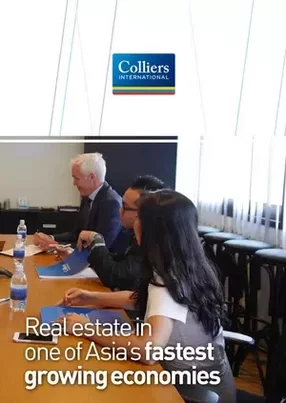Colliers International: Real estate in one of Asia's fastest growing economies
Out of Vietnam's population of 95 million, 65 percent are under 30, most of whom are well educated and have a high level of computer literacy. Thanks to this Vietnam boasts one of the fastest growing economies in south east Asia.
In 2015 three substantial revisions were made to property laws, which dramatically opened up the market to investors from other countries.
Before this it wasn't possible for foreign-owned enterprises to own 100 percent of a company without a joint venture partner, whereas now they can purchase assets and have total control of the equity. This new legislation has also made it possible for foreigners to purchase residential properties without having to do it via power of attorney or setting up a company first.
Another big change is that foreign-owned entities are now able to buy and then sublease their spaces out. David Jackson, General Director and owner of the Colliers International’s Vietnamese branch explains: "At lower levels, serviced offices can sublease space to other people, and at more advanced investment levels it means they can look at sales and leasing the buildings.
"The government is clear that they want foreign investment," he continues. "Transactions are quicker. Before if you were looking to transact on an office building you'd have to go to the Ministry of Investment, the Ministry of Finance, the Ministry of Construction. Now you can just purchase and own 100 percent of the shares of the company that owns that building, and the transaction can take a day. There's confidence and help to grow business here. It's a good place to come.”
Investor profiles
The majority of the foreign nationalities investing in corporate real estate here are Korean and Japanese. Typically they'll also buy land where they know there will be development in years to come. "
They're investing here heavily and have been for some time," Jackson explains. "They're confident, they know the market as it's close to them, and they're also involved in the construction projects."
In terms of residential real estate, there is currently a boom. Around 75 percent of the buyers are speculators and investors, who are buying properties and then flipping them to other parties before having to make the final payments on the exchange. "The best way to describe it, as somebody said to me the other day, is rather than buy a bottle of shampoo you buy a small sachet," Jackson says. "It's a quick, easy money, flip mentality."
Insider tips
For a first time property buyer, Jackson says the most important thing is to have a clear set of criteria, whether the purchase is for somewhere to live, or for a financial investment. "There are lots of different ways for the investment to happen, but I would look at whether I am purchasing it just because I like the development and I'd like to have the credibility of living there, at the yield, and how much the rent and value would be.
"Also how much investment needs doing, whether the project is sound or managed properly. A lot of people here buy newer projects, but I'm not necessarily convinced about paying a higher price because it's new on the market. There are probably better deals to be looked at where you can understand how they're structured when they're a bit more mature."
It's also key to bear capital appreciation in mind - whether a property will gain or lose value in the future, something that he says Vietnamese buyers have a good understanding of.
The real estate of Vietnam
Given the country's population, Colliers' workforce is mostly young, which influences its approach to recruitment. "We do a lot in terms of social media, our office looks young and funky, and people can see that it's part of an international organization," he says. “Additionally, a lot of staff work here by referral.”
In this region, the commercial real estate market is extremely competitive, but Jackson explains Colliers has good, longstanding partnerships with customers which is what sets it apart. "What's good for us is our accountability. We’re very quick in terms of our structure, we reorganize and assist our clients because it's very much a personal business. We have long term relationships with clients and they know we'll go 120 percent to make them happy."
Jackson is already envisaging changes like the residential burgeon slowing down while other market sectors grow, along with factors like the elections every five years. "We have to be quick to adapt," he says. "There are lots of investments happening, a lot of real estate and construction. We have to be sensitive to the market and to what our clients require. If I see that the industrial sector might be growing we'll train and bring people up to speed so we can take advantage of that."
He cites areas like IT and communications, in particular social media apps which will need addressing more and more in the coming years. But for now Colliers is thriving. "Every year for the last three years we've doubled in size and revenue," Jackson says. "The company is growing all the time, it's very positive."
- How Malaysian Resources Corporation Berhad pioneers the country’s construction space
- Grandland Group joins forces with Permasteelisa to create major global architecture playerFacilities Management
- Malaysia is set for increased tourism figures in Kuala LumpurConstruction Projects
- A 3D printing ‘Tetris’ design tower could counteract Japan’s housing shortageConstruction Projects


